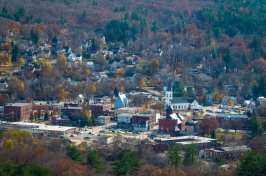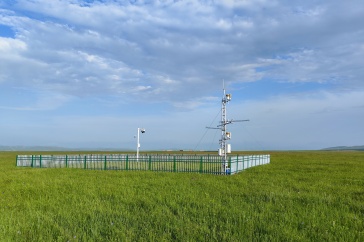
Photo by Cameron Wake.

Alaska and many other areas of the Arctic experience thousands of earthquakes of different magnitudes every year, putting infrastructure and residents in the region at risk. As part of a $3 million collaborative grant from the National Science Foundation, UNH scientists were awarded more than $1.69 million to lead research examining how climate change in the Arctic — which is warming at four times the rate of other places — could negatively affect the area’s infrastructure from seismic events and how it could impact the preparedness and response to earthquake-related disasters.
“While there is seismic activity and threat of earthquakes across the country, the accelerated warming in the Arctic, along with the remoteness of the region and the unique culture of the local and Indigenous communities, can pose distinct challenges,” says Majid Ghayoomi, associate professor of civil and environmental engineering and principal investigator. “Our goal is to take a holistic approach to help the community be prepared in this changing environment.”
The research project, part of the NSF’s Navigating the New Arctic initiative, will involve cross-disciplinary research teams from five universities; 11 Alaskan, national and international partners; and five native communities that will investigate the potential impact of earthquakes on local communities, the state of Alaska, and other Arctic and sub-Arctic regions. They will work together to assess the seismic risk to the natural environment and built infrastructure, as well as to social systems and policies.
“This project has the potential to transform and stimulate research that could lead to breakthroughs in fundamental science and engineering, informed by the community and Indigenous people, to address and improve earthquake-related hurdles facing the new Arctic.”
The project will focus on seismic activity, under climate-driven changes of the Arctic, by monitoring and modeling key infrastructure — like vital bridges and shipping ports — to simulate and evaluate the impact of permafrost thawing and seasonal freeze-thaw cycles on soils, buildings and foundations to prevent significant damage. The team will work with the communities in the Copper River Valley Region to develop their climate adaptation plans.
Researchers will engage with the community — conducting interviews, surveys and workshops — to help identify and provide them with the necessary training and tools to manage future earthquake-related disasters including planning, preparedness, mitigation and recovery skills and plans. Outreach and education will help prepare future generations by establishing learning opportunities like youth training camps and STEM research experiences for Indigenous youth.
“This project has the potential to transform and stimulate research that could lead to breakthroughs in fundamental science and engineering, informed by the community and Indigenous people, to address and improve earthquake-related hurdles facing the new Arctic and possibly other cold region environments,” said Ghayoomi.
Other team members from UNH are Katharine Duderstadt, research scientist and co-principal investigator; Yashar Eftekhar Azam, assistant professor of civil and environmental engineering; Fei Han, assistant professor of civil and environmental engineering; and Lawrence Hamilton, professor of sociology.
Collaborative institutions include the University of Georgia, Pennsylvania State University, University of Alaska Fairbanks and the University of Virginia.
-
Written By:
Robbin Ray ’82 | UNH Marketing | robbin.ray@unh.edu | 603-862-4864


















































